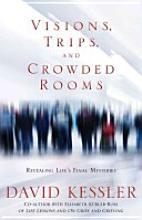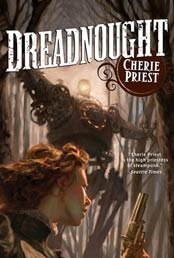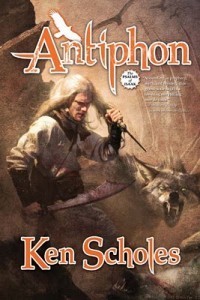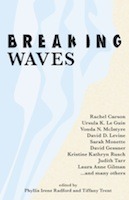Brenda Cooper's Blog, page 30
November 6, 2010
Reading Recommendation: Visions, Trips, and Crowded Rooms: Who and What You See Before You Die, by David Kessler
 I picked this up because of my recent experience in hospice with my little brother, Russ, who died of cancer. The book is simple: a series of stories about being with the dying and hearing them talk about deathbed visions. Note that these are different than NDE's (Near Death Experiences) where the person comes back. The stories are all sort of Chicken Soup for the Soul style stories – simple, simply told, and an easy read. They are all from the viewpoint of the people who work with or the dying. The patients were pretty much beyond writing by this time. Russy, for example, talked about writing back to his niece Chloe who had sent him a beautiful letter, but he really didn't have the fine motor control needed to write by the time we read him Chloe's words. Based on what I saw, most of those dying in hospice are not capable of recording their stories.
I picked this up because of my recent experience in hospice with my little brother, Russ, who died of cancer. The book is simple: a series of stories about being with the dying and hearing them talk about deathbed visions. Note that these are different than NDE's (Near Death Experiences) where the person comes back. The stories are all sort of Chicken Soup for the Soul style stories – simple, simply told, and an easy read. They are all from the viewpoint of the people who work with or the dying. The patients were pretty much beyond writing by this time. Russy, for example, talked about writing back to his niece Chloe who had sent him a beautiful letter, but he really didn't have the fine motor control needed to write by the time we read him Chloe's words. Based on what I saw, most of those dying in hospice are not capable of recording their stories.
The book helped to me, and I can imagine that it will be helpful for anyone who has or will experience the loss of someone they love dearly. Interestingly, we read an article about it in the paper while Russy was still alive but already in hospice.
Kessler discusses people seeing their mother, other dead loved ones, planning for trips, and being in rooms crowded with people waiting to see them. Some of the visions recorded in the book appear to be in line with people's religions, but many of them had no religious connotation at all.
While Russy was medicated, and so we can't know that what he saw wasn't attributable to the drugs, he spoke of being on a sailing journey during his last few days. He saw people in the right-hand corner of the room, although he didn't appear to recognize them. The doctor at the hospice talked to us about the journeys and said that it was common for people to speak about traveling in the modes they had most often used just before death, and we are a sailing family. Once of the last things Russy had wanted to do in the months before he went to hospice was go sailing, although he never managed to get there. No only do I find comfort in the idea that he managed to sail in spite of his illness, I found a lot of alignment between what we experienced and what Kessler talks about in this book.
I realize it's not my usual type of recommendation, but hey – a writer needs to read eclectically, right? And what better book than one that echoes real life (and death) so well.
October 18, 2010
Math and Beauty: Celebrating a Life
 We lost Benoit Mandelbrot. This man fired the imagination of a species by bringing us a way to see the beauty in the mathematical world, and to link the mysteries of high-order math and science to the mysteries and awe of nature.
We lost Benoit Mandelbrot. This man fired the imagination of a species by bringing us a way to see the beauty in the mathematical world, and to link the mysteries of high-order math and science to the mysteries and awe of nature.
When I first found out about the Madelbrot set, I trolled my world for the images, and sat and stared at some of them for a long time, simply blown away.
If you want more:
The Wikipedia page on the Madelbrot set
A lovely video and song about Mandelbrot that will make you smile
For another version set to music
Or for fun, this link will take you to a Google search for Mandelbrot set images
Enjoy your day, and think about the beauty inherent in coastlines and fern leaves and math!
October 17, 2010
Reading Recommendation: Dreadnought, by Cherie Priest
 I just finished Cherie Priest's Dreadnought, her second book in her Clockwork Century series. I like Cherie's world, in spite of the fact that I am generally an anti-fan of novels with zombies in them at all. At least here they remain again decently off-stage for most of the time. What Cherie puts on-stage is a lot of fun. I loved the first one in this world, BoneShaker, primarily because of the main character, Briar Wilkes. In Dreadnought, the fabulous female is nurse Mercy Lynch. Like Briar, she is really all about family, and that drives her on an adventure complete with some great steampunk machines and some nefarious characters. And a few guns.
I just finished Cherie Priest's Dreadnought, her second book in her Clockwork Century series. I like Cherie's world, in spite of the fact that I am generally an anti-fan of novels with zombies in them at all. At least here they remain again decently off-stage for most of the time. What Cherie puts on-stage is a lot of fun. I loved the first one in this world, BoneShaker, primarily because of the main character, Briar Wilkes. In Dreadnought, the fabulous female is nurse Mercy Lynch. Like Briar, she is really all about family, and that drives her on an adventure complete with some great steampunk machines and some nefarious characters. And a few guns.
As a reader, I feel like I could become Mercy with the same drivers in my life. She a real person, and not an unreachable superhero, yet at the same time she's a grand protagonist. A nice book to settle in with for a cool fall evening.
This is a travel story – and the reader is along for the ride. It's not terribly tense until the last third of the book. That was okay by me since the story absolutely delivered. But don't expect a page turner from page one.
October 5, 2010
When CTO's have Ideas that have Sex
A few weeks ago, I listened to a great TED talk by Matt Ridley called "When Ideas Have Sex." I liked it so much I showed it to my technology staff at work. I think you should go watch it, too – it only takes 17 minutes. Done?
Whether or not you watched it, the short premise is that our ideas mate, and we grow as a society because our ideas are shared. This is essentially a sexy way to talk about the network affect — the way that the more computers get connected, the more useful each computer is. Matt's talk discusses that in terms of people. The more people (and ideas) that are connected, the more useful they can all be. Pick up a random object on your desk. Could you make it all by yourself including making the raw materials? I have a Janis Ian CD – I couldn't make the music or the CD. I have a small brown hair clip that cost less than a dollar (no way I could extract the oil and use chemistry to create the the plastic and metal to make the mold), and a DVD that I just received titled "The FiRe CTO Advisory Board." Like the music CD, I wouldn't have been able to do what's on the CTO Advisory Board DVD all by myself. On it, a lot of very bright people let their ideas have sex in public.
Let me tell you about it. There's a concept called the CTO Challenge. It might have started on the ArchiTECHS TV show on the History Channel. Seattle-area technology Futurist Mark Anderson took a star from the ArchiTECHS (now canceled like most good TV), the irascible and brilliant science fiction writer David Brin. At Mark's popular Future in Review (FiRe) conferences, he puts David into the role of challenger (presenter of a need) and then questioner (challenger of the solutions) for a mixed set of Chief Technology Officers leavened with a scientist or two and maybe a government type. But weighted towards CTO's. I've seen how powerful this is; I even played David's role at the last Seattle conference.
This May at the FiRe conference, the challenge was something like:
"We must get off of the carbon economy and we must do it blindingly fast. We must figure out how to make alternative energy that scales to the huge, growing need of the modern economy to eat power."
Now the CTO's area good group to give this to – they want their businesses to be working in 10 years and they'll need this power, and they mostly have children and grandchildren who will need a world to live in. So they're motivated. They are also capable. These people built companies that deliver real products and services at scale.
So the CTO's got together and their ideas mated and had sex and created new ideas (which will now mate…you get the idea?)
And that's what is on the CD on my desk. Here's a link to the problem about energy scaling in the form of a five minute video by Nate Lewis, who presented at FiRe, and here is a link to a web-site where he lays out some interesting statistics. Of course, the CTO's did a great job. Even though it is about an hour long, I suggest you drop by the FiRe site and watch the video of the session if just to get a sense of the energy and excitement around the ideas (and no fair beating the ideas up yet – this is the brainstorming part of the process, and they did really well). Alternatively, there is a good post-session blog from just after the conference.
So why am I talking about this now? Three reasons:
1) I'm a believer on the problem and the need for a solution, and in the raw creativity of the CTO Challenges. I want to help find ways to make the ideas stick.
2) I'm reading The Rational Optimist, by Matt Ridley (the "When Ideas Have Sex" author and speaker) and so I found it nicely synergistic to be presented with such a good example of sexy ideas just at this time.
3) The FiRe Global conference is next month at the Four Seasons in Seattle. It's time to register. More of this stuff will happen there – it's a good place to go pick up on ideas and take them home with you. Yes, the conference is expensive. Yes, I'm on the advisory Board for the conference, but I don't get a break for signing people up. I pay to go, because it's worth it. Maybe I'll see you there. Here's my blog about last year's conference.
Whatever I do today, I'll be encouraging my ideas to have sex. And while they're off having fun, I'll be sitting at my computer in the salt mines of a CIO's job which is…wait for it…encouraging ideas to have sex.We live in a pretty cool world.
October 1, 2010
Reading Recommendation: Antiphon, by Ken Scholes
Just finished this last night. Loved it. This is the third book in the "Psalms of Isaak" series, and if anything, it is even stronger than the first two. There is something very lovely about a series where the books get better as they go.
Loved it. This is the third book in the "Psalms of Isaak" series, and if anything, it is even stronger than the first two. There is something very lovely about a series where the books get better as they go.
This series falls into the "big fat fantasy" genre, although luckily the books can be picked up and carried around (I just ordered the latest Brandon Sanderson, "The Way of Kings," and I can already tell I will need a digital format copy if I want it to be portable – the physical thing is an anvil of a book that should have been released in modules or something).
There is all of the complexity of a George R.R. Martin series at a more palatable length, and with as much lovely surprise and twisty plot happiness. Many times throughout this book things happened which I hadn't seen coming.
Small warnings: Ken's world is complex enough that you may want to keep all three books nearby, and maybe skim the others. I didn't, and it took me the first quarter of the book to feel re-grounded in the Churning Wastes and the Ninefold Forests. But then that complexity of world is why I love fat fantasy books.
There is also new cover art for the series which I like much better. I liked the old art too, but these are more personal.
I highly recommend it!
September 27, 2010
Listen up, writers! The joy of podcasts
Yesterday I had one of those long 8 hour drives through the country, me and my golden retriever and and a bunch of podcasts.
I've taken a real liking to having stories told to me. Here are some of the reasons:
As a writer, it's an easier way for me to disengage the critical brain, and have an emotional reaction to story. That is, after all, a big part of why I read and write. To feel. Yesterday I discovered a new story by a new writer I'd never heard of (Paper Cradle by Stephen Gaskell, read by Kate Baker, available at Clarkesworld) which made me cry.
They're almost always free. I like audio-books, too. But they're usually around $30 a shot and take a long time. If I did all my audio in audio-books, I'd be broke. I DO drop bits of money toward the podcast producers from time to time via their websites, and if you like the work, you should too. This is how we keep them around.
Short fiction lends itself really well to podcasts
It helps me pay more attention to the audio quality of my prose. Yes, works on a page have an audio quality. I now read my work out loud as a last step before sending it out. If nothing else, this saves embarrassment while reading in front of audiences at bookstores and cons.
Podcasts extend my "reading" day – I can engage in fiction while dog walking and gardening and laundering and working out, and with the day job and professional writer and family superwoman outfit on (a bit torn around the edges and mended here and there), it helps to have yet another way to screw up my mind with multitasking.
What do I listen to? Well, a lot, but here are two which I drop into my iphone automatically
StarShipSofa - a fabulous, rambly, whole magazine with a regular host (Tony C. Smith) who now feels like a friend to me even though I've never met him. This is sort of like loving a drive time DJ, only Tony is DJing stuff like interviews with authors, science fiction history, and science fiction (old and new) by some of our best authors. And quirky as it may sound, Tony has a nice accent. In audio, that matters. One small word of caution – sometimes Star Ship Sofa clocks in over two hours, which means I don;t end up with time to listen to all of it sometimes. Star Ship Sofa won the Hugo this year for best fanzine.
Clarkesworld Audio Fiction: Just the fiction, no magazine and not much news. This is nice for a single walk or housecleaning session. I can count on the stories being excellent and the narration being excellent as well: crisp and well-read. Since they are reading the new fiction in the magazine, this is cutting-edge relevant fiction. Clarkesworld chooses a mix of fantasy and science fiction that seems to come in at about half and half. This suits my personal tastes well. The fiction quality at Clarkesworld is so good that almost half the stories end up on my awards consideration or reading recommendation lists, or I just have to tweet about them…. Clarkesworld won a Hugo for best semi-prozine this year.
Other podcasts I listen to and wish I had time to listen to more often include Seattle Geekly (cultural geeky stuff from my general neighborhood, great hosts), Escape Pod (science fiction, largely reprint, mostly excellent stories, audio quality below Clarkesworld or I'd listen to them more often), Adventures in Sci Fi Publishing, The Nature Podcast, etc. So it's not all fiction. These are MY tastes – there's are so many podcasts out there I suspect you can find the ones that fit your tastes the best.
If you're not sure about the value of podcasts, go listen to Paper Cradle or The Cull at Clarkesworld. Your computer can play them for you while you organize paperwork.
September 21, 2010
Reading Recommendation: The Man Who Hated Gravity, by Ben Bova
Sometimes science fiction should be a little bit fun. It isn't always, which I'm glad of. I recently wrote a guest post over at sfsignal about how good sf is at warnings. Which it is.
But some days I'm happy we know how to have fun. I had a long drive this week, and as usual I listened to Starship Sofa. As usual, the Sofa was great (if, also as usual, long!). But it's worth listening to. I just loved the Ben Bova story, "The Man Who Hated Gravity." It's not a straight up comedy or...
September 19, 2010
Celebrating Strange Horizons
 Strange Horizons is ten years old. I'm on my way from Seattle, WA to Bend, OR today, and stopping by Portland, OR to do a reading to celebrate Strange Horizons' anniversary. Strange Horizons was one of our first electronic genre magazines, and I'm pretty sure it was the first to make it this long with a robust readership while paying professional rates. I had a story come out there in 2004, The War of the Flowers, and a poem last year (The Multiple Universe Poems).
Strange Horizons is ten years old. I'm on my way from Seattle, WA to Bend, OR today, and stopping by Portland, OR to do a reading to celebrate Strange Horizons' anniversary. Strange Horizons was one of our first electronic genre magazines, and I'm pretty sure it was the first to make it this long with a robust readership while paying professional rates. I had a story come out there in 2004, The War of the Flowers, and a poem last year (The Multiple Universe Poems).
Strange Horizons was a l...
September 15, 2010
If You Care About the Sea
 You might want to pick up Book View Café's benefit anthology for gulf relief. It's only $4.99, available in a number of electronic formats. I have an original essay in it (almost more like an original rant) on the dangers of ignoring the ocean. There is original and reprint fiction, poetry, and other essays in it too….you won't be disappointed. I promise. And it goes to a good cause. None of us writers get a penny – it's all going to the gulf coast.
You might want to pick up Book View Café's benefit anthology for gulf relief. It's only $4.99, available in a number of electronic formats. I have an original essay in it (almost more like an original rant) on the dangers of ignoring the ocean. There is original and reprint fiction, poetry, and other essays in it too….you won't be disappointed. I promise. And it goes to a good cause. None of us writers get a penny – it's all going to the gulf coast.
Here's part of the press release:
...
September 13, 2010
Futurist Trivia: The Sunday Times
People often ask me where I get my ideas as a writer. The companion question as a futurist is "how do you study the future?" The answer, of course, is you study "now" and you study the past. Then you think a bit. Futurists aren't predictors partly because we can't see the wildcards or the unexpected things – most of us missed the internet at first, and then "got it" before a lot of other people did. Except the geeks – who missed the amount of marketing money that would go into it but...



